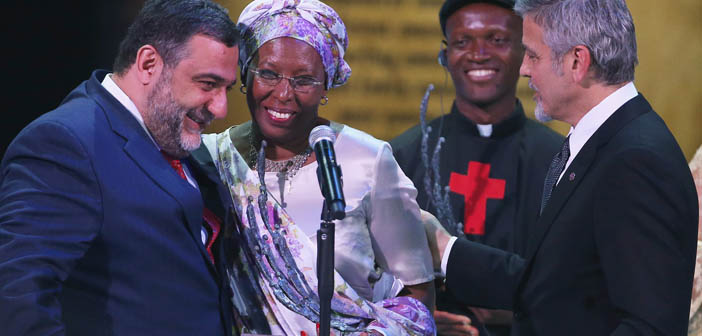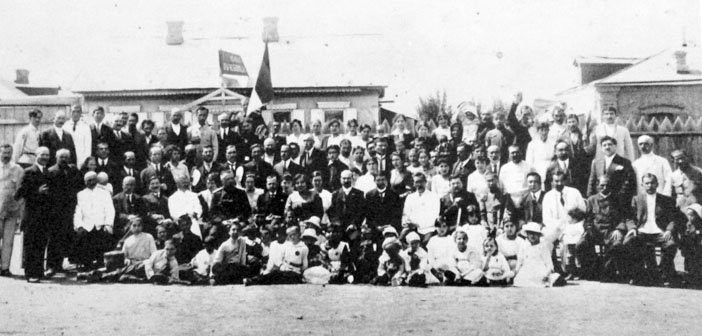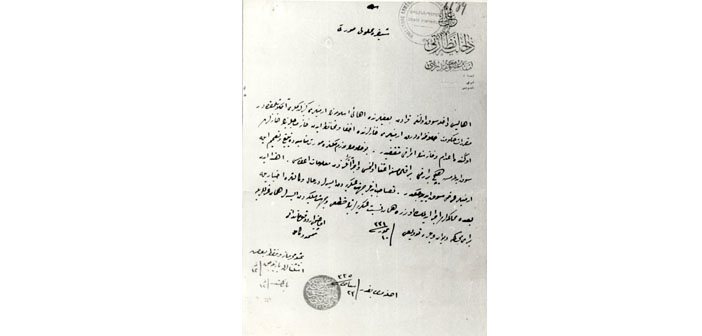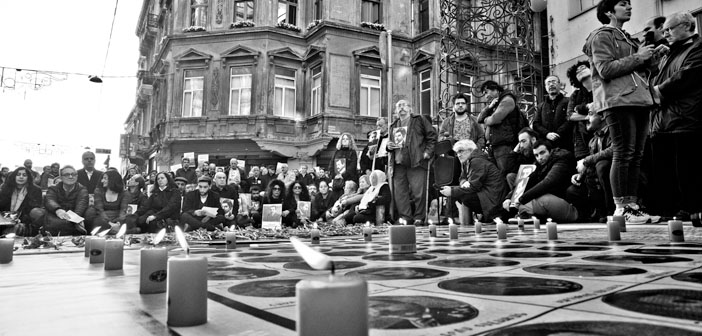101st anniversary of the Armenian Genocide was commemorated with Aurora Prize, which is one of the most innovative events of the year and named after Aurora Mardiganian, a genocide survivor who witnessed the killing of her relatives. The winner of the prize that was granted for the first time is Marguerite Barankitse (Maggy), who saved hundreds of orphans' lives during the civil war in Burundi.
Yerevan, during the week of April 24, was full of human rights activist, writers, academics and journalist from all around the world. “100 Lives” initiative, which focuses on the survivors of the Armenian Genocide and the inspiring stories of the people who saved Armenians, brought a new perspective to the commemoration of genocide by discussion sessions and the Aurora Prize for Awakening Humanity that is given for honoring the people who try to save lives under extraordinary conditions. Armenians faced the present by commemorating the helping hands that reached out for them in the midst of massacres and honoring the ones who are risking their lives for saving other people. And the genocide is started to be discussed through the survivors, just like Hrant Dink wished. These developments are maybe one of the most beautiful ways to say “never again”on behalf of all peoples in the world.
The first winner is Maggy
101st anniversary of the Armenian Genocide was commemorated with Aurora Prize, which is one of the most innovative events of the year and named after Aurora Mardiganian, a genocide survivor who witnessed the killing of her relatives. The winner of the prize that was granted for the first time is Marguerite Barankitse (Maggy), who saved hundreds of orphans' lives during the civil war in Burundi. It is estimated that Barankitse saved almost 30.000 orphans, since the civil war broke out in Burundi. Moreover, she initiated the establishment of an hospital in 2008 and almost 80.000 patients were treated there. Because of the war, Barankitse carries on her struggle as a refugee. Barankitse, in her acceptance speech, said: “This morning, when I went to your Memorial, the 24th of April, it reminded me it is exactly the date when I left my country. It is exactly on April 24 of last year that I fled Burundi. I would like to thank Armenia for giving me hope for going back to my country one day." Aurora Prize Laureate Barankitse, who founded an orphanage for children who were orphaned as a result of the uprising started in Burundi and devastated Rwanda and Democratic Republic of Congo, received $100,000 and will donate $1,000,000 award to organizations that have inspired her work. Barankitse plans to donate the award to three organizations in order to advance aid and rehabilitation for child refugees and orphans, and fight against child poverty. These organizations are: the Fondation du Grand-Duc et de La Grande-Duchesse du Luxembourg, Fondation Jean-François Peterbroeck (JFP Foundation), and the Fondation Bridderlech Deelen Luxembourg.
“Next year, someone from Turkey might be the winner”
After the award ceremony, founder of “100 Lives” Ruben Vardanyan, Flagship Ventures CEO Noubar Afeyan, Carnegie Foundation Chair Vartan Gregorian and Aurora Prize Laureate Barankitse answered the questions of the journalists. Vartan Gregorian, after a journalist asked his opinions about US President Obama's April 24 statement, pointed out that “Medz Yeğern” is no different than the word genocide. “President Obama has always been using 'Medz Yeğern' instead of genocide. I understand the policy of the US in the midst of all the crises. On one hand, there is the pressure from Turkey. I think that we should explain what Medz Yeğern means; we should translate it. The definition of Medz Yeğern, which Armenian people use for defining 1915, is same with that of genocide. It means 'genocide' in English. If I were Jewish and the President were using 'Shoa' for defining the Jewish Genocide, I would say that Shoa means Holocaust. We cannot waste another century by discussing this. Saying it in Armenian or in English doesn't make any difference. Turkey's recognition of genocide is important for Turkey, not for Armenian people. It is important in regard to historical consciousness.”
Pointing out that this issue is between two nations (Armenians and Turks), Vardanyan said: “I won't talk about Obama's decision. Frankly, I am not interested in what US President says about what happened to my people. I am not interested in what anybody says. I think that this issue is between two nations. We, as the nation which suffered from this terrible event, remember what happened and never forget what happened to our families, we continue living and say we are strong. On this point, why should we care about who calls this a genocide? I don't need anybody to prove that almost all relatives of my grandfather were killed. This situation is hard for people living in Turkey. Maintaining the denialism is getting harder and harder. Denial of the history makes progress impossible. You get stuck in the past and cannot heal.”
Someone commented on the fact that a finalist is from Pakistan, which doesn't recognize Armenia and Vardanyan said in response: “We grant the prize to the people who make extraordinary efforts for saving lives. Next year, there might be a nominee from Turkey and that person might even win the prize. Maybe you would be mad at me, but be prepared for this.”
Vartan Gregorian: “Turkey could have been a role model, but it has chosen to be an unidimensional society”
One of the founders of “100 Lives”, member of Aurora Prize Selection Committee and Carnegie Foundation Chair Vartan Gergorian spoke to Agos and pointed out the importance of organizing such an event in Yerevan: “This time, instead of talking about the genocide, the world commemorated the genocide by seeing and feeling it. Until this year, we have been mourning for the ones we lost in 1915. 2016 is the beginning of a new century. With Aurora Prize, we want to bring a new perspective to commemorating the past and creating the future. We started out with the purpose of honoring and supporting people who risk their lives for saving the others. We talk about the resurrection of Armenia. This doesn't mean that we forgot the past. This is a part of the whole. The ones who saved Armenians 100 years ago are also the parts of the history.”
Gregorian also talked about Turkey's position: “The notion of citizenship should be understood better. We are talking about the preservation of the memory. Citizens of Turkey kept their memories for themselves for a long time. Hrant Dink made this a issue of Turkey. Dink reminded that we should take stand not against Turkey or Turks, but against state policies. Citizens of Turkey have the right to know who dragged the country into a war, who distorted the notion of citizenship and who violated the human rights. What Armenians and other minorities had in the country once should be recognized historically. We need liberty of conscience. Turkey would be empowered by the strength of Armenians and minorities. Turkey could have been a role model with its multicultural structure, but it has chosen to be an unidimensional society.





